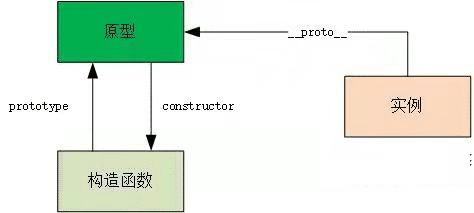new的用处
new的作用是通过构造函数来创建一个实例对象,该实例与原型和构造函数之间的关系如下图所示:

具体步骤
javascript中的new是一个语法糖,new的过程如下
- 在内存中创建一个新对象
- 这个新对象内部的[[Prototype]]指针被赋值为构造函数的 prototype 属性
- 构造函数内部的 this 被赋值为这个新对象(即 this 指向新对象)
很多直接把下面4.5的归为一步
- 执行构造函数内部的代码(给新对象添加属性)
- 如果构造函数返回非空对象,则返回该对象;否则,返回刚创建的新对象
模拟 new 操作符
方案一
1
2
3
4
5
6
7
8
9
10
11
12
13
14
15
16
| function _new(constructor, ...arg) {
const obj = {};
obj.__proto__ = constructor.prototype;
const result = constructor.apply(obj, arg);
return typeof result === 'object' ? result : obj;
}
function Foo(name) {
this.name = name;
}
var luckyStar = _new(Foo, 'luckyStar');
console,log(luckyStar.name);
|
方案二
1
2
3
4
5
6
7
8
9
10
11
12
13
14
15
16
| function _new(fn, ...arg) {
const obj = Object.create(fn.prototype);
const newObj = fn.apply(obj, arg);
return newObj instanceof Object
}
function GirlName(name, age) {
this.name = name;
this.age = age;
this.sayName = function () {
console.log(this.name);
};
}
const xiaoMei = _new(GirlName, 'Xiao Mei', 18)
console.log(xiaoMei)
|
方案三
1
2
3
4
5
6
7
8
9
10
11
12
13
14
15
16
17
18
19
20
21
22
23
24
25
26
27
| function New() {
let obj = {};
console.log(arguments);
let constructor = [].shift.call(arguments);
console.log(arguments);
if (constructor.prototype !== null) {
obj.__proto__ = constructor.prototype;
}
let ret = constructor.apply(obj, (arguments.length === 1 ? [arguments[0]] : Array.apply(null, arguments)));
console.log(arguments);
console.log(typeof ret);
if ((typeof ret === "object" || typeof ret === "function") && ret !== null) {
return ret;
}
return obj;
}
function name(a, b) {
this.a = a;
this.b = b;
}
let c = New(name, 1, 2)
let d = new name(1, 2)
console.log(c);
console.log(d);
|
为什么要判断返回值的类型?
这是因为new一个实例的时候,如果没有return,就会根据构造函数内部this绑定的值生成对象,如果有返回值,就会根据返回值生成对象,为了模拟这一效果,就需要判断apply后是否有返回值。
1
2
3
4
5
6
7
8
9
10
11
12
13
14
15
16
17
| function GirlName(name, age) {
this.name = name;
this.age = age;
this.sayName = function () {
console.log(this.name);
};
return {
name: 'Tomboy',
age: 30,
sayName: function() {
console.log(this.name)
}
}
}
|
1
2
| let xiaoMei = new GirlName('Xiao Mei', 18);
xiaoMei.sayName();
|
